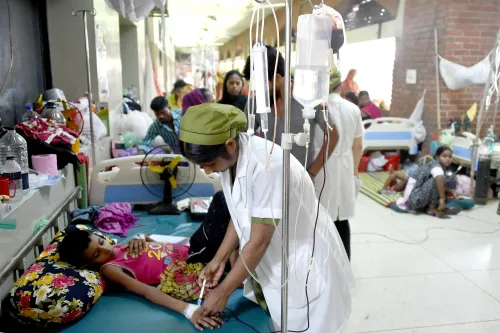Should Mental Health Support Be Integrated into Cancer Care?

Synopsis
Key Takeaways
- Integrating mental health support is essential for cancer care.
- Both survivors and caregivers face unique psychological challenges.
- Long-term side effects and identity shifts can impact mental well-being.
- Caregivers often feel overlooked in the cancer care process.
- A holistic approach is needed to support all individuals affected by cancer.
New Delhi, May 1 (NationPress) Integrating mental health support into cancer care is essential and can significantly enhance the well-being of both survivors and their caregivers, according to a recent study conducted by oncologists from the All-India Institute of Medical Sciences (AIIMS) in Delhi.
The findings, published in the Asian Pacific Journal of Cancer Prevention, highlight the often-overlooked psychological challenges that cancer survivors and their caregivers endure.
A cancer diagnosis not only impacts physical health but also instills feelings of fear, uncertainty, anxiety, and depression—elements that can severely diminish the quality of life for both patients and their caregivers.
“We recommend the incorporation of mental health services within standard oncology practices, increasing access to psycho-oncology, and acknowledging the requirements of caregivers,” stated Dr. Abhishek Shankar, Assistant Professor, Department of Radiation Oncology, Dr BR Ambedkar Institute Rotary Cancer Hospital at AIIMS, Delhi, in an interview with IANS.
The research emphasized that after treatment, patients encounter an array of new challenges, such as managing long-term side effects and adapting to new physical limitations. They also grapple with reconstructing their identity after such a transformative experience, which can adversely affect their mental health.
While patient needs have traditionally been the focal point, caregivers—who play a vital role in supporting patients emotionally and physically, coordinating treatment, and managing the everyday realities of cancer—are frequently neglected.
The study revealed that caregivers face distinct psychological hardships, including feelings of helplessness and burnout, along with anxiety, depression, and isolation.
This highlights the pressing need to address the psychological needs of all individuals affected by cancer, whether they are survivors or caregivers, as noted by the researchers.
“Despite advancements in cancer therapies leading to improved survival rates, mental health support remains insufficient. A holistic approach that includes psychological care is crucial to ensure that both survivors and caregivers receive the comprehensive support they need in their cancer journey,” Shankar emphasized.









